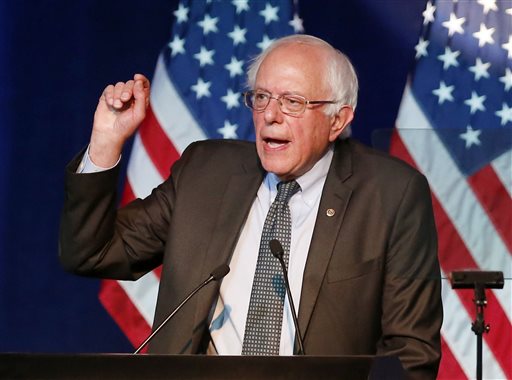
By Bailey Hosfelt
With a large majority of United States university students identifying as liberal, Vermont Senator Bernie Sanders is rapidly gaining support from individuals within the 18-22 age demographic. While he is not affiliated with either political party, Sanders is running on the Democratic ticket alongside Hilary Clinton. As he begins to surpass Clinton in polls that track the favorability ratings of candidates, the question arises: Why is Bernie Sanders so popular among college students?
The answer revolves mainly around Sanders’ progressive views. Many of the topics highlighted in his list of presidential priorities coincide with those discussed passionately on college campuses nationwide. Because Sanders dedicates himself to ensuring racial justice, women’s rights, job creation and affordable higher education, his platform closely aligns with prevalent beliefs of college students. For this reason, many politically-conscious and socially-aware Millennials have welcomed his campaign with open arms.
Characterized by the media as a Democratic socialist, some question the validity of Sanders’ governmental approach, for his far-from-moderate politics seldom align with the Democratic party. In other words, Sanders is a political outlier, and his campaign thus far reflects his different method of politics. While many candidates build their campaigns around foreign policy or fiscal strategy, Sanders focuses primarily on social matters.
However, his rise in popularity confirms that many young voters find his forward-thinking strategy highly appealing, especially in a time when our nation is questioning our societal ethos due to recent racial tensions in Ferguson and Baltimore. Therefore, his chances of gaining the Democratic nomination are increased.
Among the many reasons to like Bernie Sanders, his personal history of stability is most noteworthy. Sanders boasts an impeccable record free from the type of scandal Clinton’s campaign is working tirelessly to overcome. Additionally, his voting record remains impressively consistent: his early support of marriage equality can be traced back over three decades to a 1983 vote in favor of Burlington, Vermont’s first pride parade. This example shows that Sanders has not changed his personal and political ideals simply to appear more attractive and gain the support of additional voters. Rather, he firmly believes in remaining authentic and honest with his constituents.
In a time when candidates rely heavily on political action committees, commonly referred to as super PACs, to raise large, unlimited sums of money to fund their campaigns, Sanders’ refusal to accept big offers from billionaires is refreshing. He is instead taking a minimalistic fundraising approach consisting of donations through his website, which average at about 40 dollars each. This strategy is certainly commendable and frankly unheard of in an era when campaigns are frequently dominated by those within the top tier of wealth.
Despite the fact that Sanders is the oldest candidate, he has a sense of allure considering his political experience during periods of governmental triumph and also extreme hardship. Based on the positive turnout at his recent campaign rallies and speaking events, one notices that Sanders is reaching a wide demographic consisting of both the young and old. As polls indicate, students newly eligible to vote in the 2016 election are eagerly joining his campaign after learning that his progressive and advantageous political approach parallels their primary social concerns.
In consequence to Sanders’ popularity among the young population, when looking at the reality of the situation, I do not believe that he is the proper fit for our next president. Yes, his viewpoints are refreshingly progressive, but a candidate who does not clearly identify as left or right wing can be easily seen as quite the presidential gamble.
His speeches often reiterate the idea of an unflawed society filled with utmost justice and equality, which is clearly what we all hope for as nation. However, a political blueprint solely emphasizes social matters will not find success in our current government filled with large amounts of gridlock. By avoiding the presentation of a sound strategy for foreign policy, Sanders overlooks a crucial hot topic: the recent passage of Obama’s Iran Nuclear Deal and the inevitable backlash from Republican politicians that will follow.
Bernie Sanders’ political campaign is certainly one of theoretical promise and prosperity, but one that ultimately lacks the element of powerful tenacity. It fails to clearly convince the population that Sanders could serve a presidential term in which he successfully progresses our nation.
Bailey Hosfelt, FCRH ’19, is a psychology major from Bergenfield, New Jersey.














































































































































































































